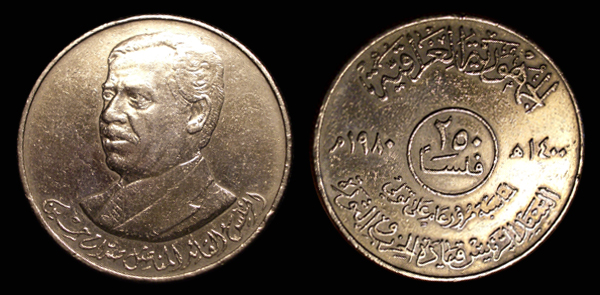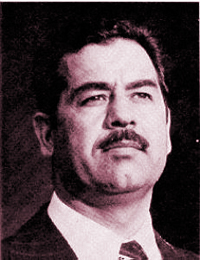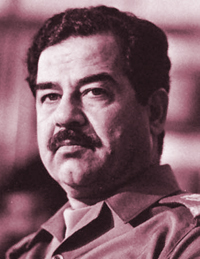
250 FILS COIN - IRAQ - SADDAM HUSSEIN FIRST ANNIVERSARY
(KM 146)
Date: A.D. 1980
Obverse: Portrait head left - THE PRESIDENT AND LEADER SADDAM HUSSEIN
Reverse: Lettering - 1980 - 1400 250 FILS ON THE OCCASION OF THE FIRST ANNIVERSARY OF THE ASSUMPTION MR. PRESIDENT THE LEADER OF THE PARTY OF REVOLUTION
|
This coin was minted in Iraq, a large oil rich nation in south western Asia. This coin depicts Saddam Hussein, as the 5th president of Iraq. Born in 1937 Saddam Hussein managed to rise from very humble and abusive beginnings to take control of Iraq as President in 1979 and holding that office for 24 years until his removal by US forces in 2002 and subsequent execution in 2006. Saddam was politically active as a young man and was involved in a failed assassination attempt that forced him to leave Iraq to live in exile in Egypt. He would return more driven than ever and become a leading member of the Iraqi Ba'ath Party, which espoused secular pan-Arabism, economic modernization, and Arab socialism, and he would play a key role in the 1968 coup that brought the party and eventually him to long-term power. He became Vice President under his cousin Ahmed Hassan al-Bakr but his growing influence was apparent and upon al-Bakrs resignation he became president and quickly took steps to solidify and safe guard this position by eliminating many rivals and threats. He instituted an authoritarian government that exercised strict control over Iraqi society, government institutions, and military. Under his long presidency he help modernize Iraq, he established lucrative trade agreements that enabled him to use oil wealth to build Iraqi infrastructure, he built the Iraqi military into one of the largest in the world and under his secular government Iraqis enjoyed rare freedoms for a middle eastern society. Unfortunately Iraqi modernization and secular government came at a price. He strongly opposed ethnic or religious groups that sought independence or autonomy and many accuse him, his sons and his party of brutality and crimes against humanity. Saddam and the Ba'ath party exercised complete control over the military, the government, the courts and the media and did not hesitate to use that power to remove anyone who may oppose them. He maintained power and the relative good graces of the international community through the Iran-Iraq War (1980–1988) until he took aggressive action against Saudi Arabia and Kuwait which began the first Gulf War in 1991. Saddam remained in power after the Gulf War and remained defiant of international criticism, and U.N. resolutions until he was removed from power in the US led invasion of Iraq in 2002. In 2003 his sons Uday and Qusay and 14-year-old grandson Mustapha were killed in a three-hour gunfight with U.S. forces and Saddam was captured in the same year. He remained defiant as he was tried by the Iraqi Interim Government and convicted for the executions of 148 Iraqi Shi'ites suspected of planning an assassination attempt in 1982. He was sentenced to death by hanging and was executed on December 30, 2006. Saddam was buried at his birthplace of Al-Awja in Tikrit, Iraq, 2 miles from his sons on December 31, 2006. Al-Iraq is the name used for this territory since the 6th century A.D. but Iraq was historically known as Mesopotamia, which literally means "between the rivers" and was home to the world's first civilization, the Sumerian culture, followed by the Akkadian, Babylonian, and Assyrian societies as well as being held by the Greeks, Romans, Parthians, Persians, Turks and the United Kingdom . It is often referred to as the "cradle of Civilization". Modern Iraq was formed out of three former regions held by the ottoman empire: Mosul, Baghdad and Basra. Iraq gained independence in 1932 but was then invaded and occupied again by Britain during WWII to secure it against Nazi Germany. After the war Iraq was a monarchy until 1958 when it was overthrown by the Iraqi army in what is referred to as the 14 July Revolution. After a succession of different leaders took power only to be overthrown the Arab Socialist Ba'ath Party took power. The Ba'athists key figure became Saddam Hussein who acceded to the presidency and control of the Revolutionary Command Council (RCC) on the resignation of his cousin president Ahmed Hassan al-Bakr becoming the 5th president of Iraq in July 1979, killing or imprisoning many of his opponents in the process. After international sanctions and two major conflicts stemming from Iraqi military aggression against neighboring countries, U.S. and coalition forces removed Saddam Hussein from power in 2002. They have since worked to install a democratic government that is acceptable to the various ethnic groups while attempting to rebuild a nation that was, at one time, a thriving, industrialized, progressive and wealthy Islamic nation. The new Iraqi government must now face the Insurgencies, terrorist attacks and sectarian violence that have plagued the country since the fall of Saddam. Saddam Hussein was sentenced to death by hanging and was executed on December 30, 2006. |


